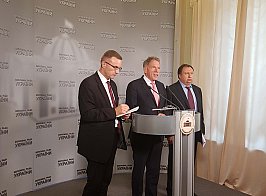International activity
‘Ukraine's move towards the EU also depends on the readiness of European institutions’ said Ivanna Klympush-Tsintsadze
The Chair of the Committee on Ukraine’s integration into the EU took part
in the discussion ‘Real policy/ideal policy: West after February 24’
within the framework of the ‘Riga Conference 2022’.
The participants discussed the format of the Eastern Partnership as a tool
for the European integration of Ukraine, Georgia and Moldova. Ivanna
Klympush-Tsintsadze noted that the Eastern Partnership as a foreign policy
format of cooperation between the European Union and its neighbours, which
was launched back in 2009, does not longer exist today. Its participants —
Azerbaijan, Belarus, Armenia, Georgia, Moldova and Ukraine — each went its
own way. ‘The Eastern Partnership is dead, and we have to admit it. As the
North American Indians say, if the horse is dead, dismount! We should
focus on the future, not on the past, to look for new tools and
opportunities’, said the Chair of the Committee.
She expressed her gratitude to the European community for granting Ukraine
the status of a candidate for the EU membership. She also appealed to the
partner countries Moldova and Georgia with a call for stronger support for
Ukraine: ‘We hope that Georgia and Moldova understand that if Ukraine
falls, they will have no chance to keep their security, to preserve their
independence and statehood. It is not only about our survival. If all of
us together cannot defeat the Russian aggressor, it will have terrible
consequences for your countries and for the entire geopolitical and
security order in the world’. The Chair of the Committee is convinced that
these countries can do a lot to support Ukraine: fight Russian propaganda,
introduce additional sanctions against the Russian regime, deny entry for
Russian deserters who are fleeing the Russian Federation instead of taking
responsibility and oppose Putin's dictatorial regime.
Regarding Ukraine's prospects for transitioning from candidate status to
the start of negotiations on joining the European Union, Ivanna
Klympush-Tsintsadze is sure that a realistic approach should be used. In
Ukraine, according to her, there is a great desire to move quickly. But
this depends both on the speed of Ukraine, the implementation of the seven
requirements, which accompanied granting Ukraine candidate status, and on
the capacity and readiness of the institutions of the European Union.
According to the Chair of the Committee, they should be ready to promptly
provide feedback on urgent issues, such as conformity assessment,
expertise, etc. ‘We do not have it now. And the speed is slower than the
Ukrainian Government had hoped for. I belong to those people who
appreciate and consider all aspects of this movement. So, I don't think we
should expect accession negotiations to start in 2023, but I want to be
wrong. And I assure you that in the Ukrainian Parliament, as well as, I
hope, in the Government, we are ready to work on our part of the homework
even though we must at the same time fight in this bloody war’, said
Ivanna Klympush-Tsintsadze.

